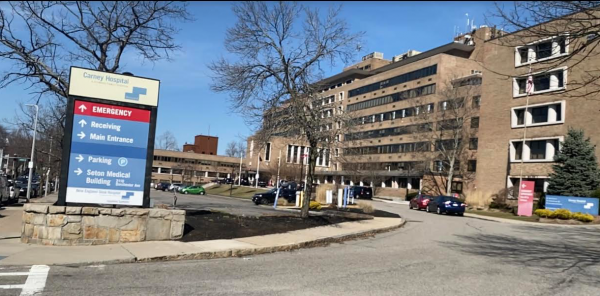April 5, 2020

Steward Health Care, which owns Carney Hospital in Dorchester, continues to prepare for an expected surge in admissions of COVID-positive patients at the Dorchester Avenue facility. On March 17, Steward announced that the hospital had begun converting its inpatient units into a specialized coronavirus treatment center. The first unit had 11 beds.
The Carney is currently expanding its capacity beyond that number and, said Nicholas Puleo, a spokesman for Steward, it “has temporarily suspended inpatient admission for non-COVID-positive/non-[Patient Under Investigation] patients. This will best position us to care for people suffering from – or suspected of having – coronavirus as the number of those impacted begins to surge in the Commonwealth.”
Carney will transfer those requiring inpatient admission to another Steward Health Care facility, Puleo said, adding that the emergency department remains open to “all in need of emergency care.”
The Seton Building next to Carney, which houses doctors who typically see patients in their offices, remains open, and appointments “will continue at the discretion of providers in consultation with their patients,” Puleo said.
The Carney was the first hospital to designate itself as coronavirus facility in the nation last month, according to Steward. This weekend, the health care system also began transforming Morton Hospital in Taunton into a dedicated care center for patients who test positive for the virus.
The changes associated with the "proven isolation strategy," according to Steward, include better care and recovery chances for COVID-19 patients, reduced mortality rates, and better capacity for other Steward hospitals to care for patients undergoing treatments for health conditions unrelated to the virus.
Dr. Joseph Weinstein, chief medical officer for Steward Health Care, said that traditional models of care are ineffective at addressing the surge in virus cases, citing "lessons from Italy and China” while noting that significantly lower infection and mortality rates were achieved in places like Germany and South Korea, where hospitals clustered COVID-19 patients in isolated locations, thus lessening the chance of infection for other patients and staff.”
Steward operates 35 hospitals in 9 states and serves more than 6 million patients annually.
The company also reported on Sunday that it had launched a program "months ago" to acquire and stockpile specialty ventilators and personal protective equipment to treat COVID-19 patients as part of preparations for the arrival of the virus. Once the coming surge declines, the company plans to move unused equipment to its other hospitals as those facilities deal with an influx of patients.
The claims about preparedness conflict with assertions from the Massachusetts Nurses Association, which represents more than 2,750 nurses and health care workers in eight Steward-owned hospitals in Massachusetts. On Friday, the nurses union alleged that Steward is inconsistently providing protective equipment like N95 masks and gowns and that nurses "are forced to reuse soiled masks for days.
"If the stockpile exists, there is a disconnect because the supplies are not generally accessible to staff when needed," the union said.
In a statement released by the nurses association on Friday, Carney Hospital nurse Peg Conlon said, "Yesterday there were not enough N95 masks available in the ICU, in the special COVID-19 units, or anywhere in the hospital. What we do see is a dangerous rationing of PPE at Carney, which is a guarantee for more spread, and of a loss of staff as more of us become sick."
Inadequate access to personal protective equipment has been a worldwide problem, putting health care workers at risk and aiding in the spread of the virus.


